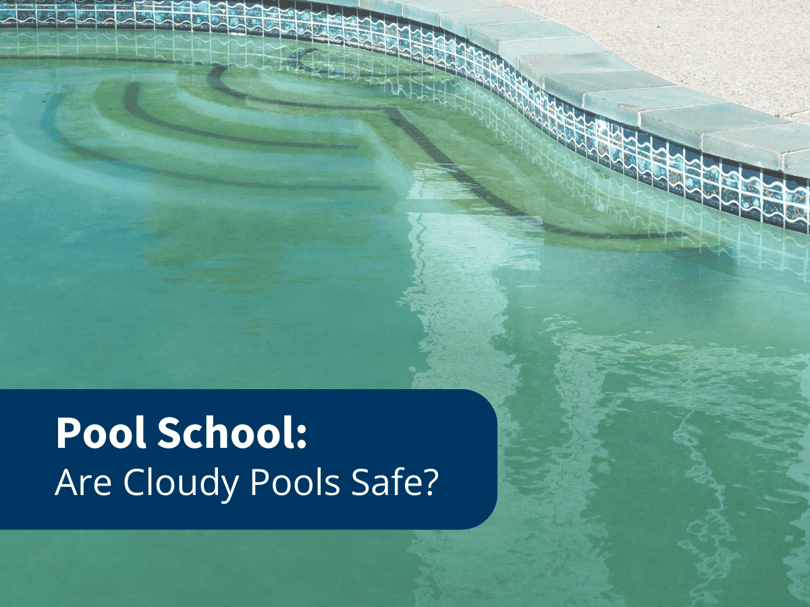
You had your heart set on a dip in the pool, but now you are wondering if cloudy pools are safe. The quick answer is, "NO!" Cloudy pools are not safe, and no one should be allowed to swim in a cloudy pool until it is clear. Let's learn about this common pool issue.
Here's Why You Have Cloudy Pool Water
Before we discuss the dangers of cloudy pool water, let's explain the causes so you’ll know how to treat it.
- Imbalanced Pool Chemical - When the chemicals in your swimming pool are not correctly balanced, it can cause bacteria to grow. Algae can also develop if the pH levels are not properly balanced. Chlorine is essential - when your pool does not have the correct amount, you have the potential for cloudy water. Grab your pool test kit and see if imbalanced chemicals are the source of your cloudiness issue.
- Faulty Filter - Poor filtration is another possible cause of cloudy water. First, ensure your filter and skimmer basket are clean of debris. When your filter is dirty, it cannot work correctly. Replace your filter cartridges or use a filter cleaner to get things back on track. Additionally, consider whether you're running the filter enough. Even if it is working correctly, if you are not running it long enough, it may not thoroughly be able to do its job, resulting in cloudy water.
- High Levels Of Alkalinity - High pool alkalinity levels can significantly impact the clarity of your swimming pool water. Avoid high alkalinity levels because they interfere with the pH balance in the pool. If the total alkalinity is too high, it can lead to an increased presence of scale due to calcium deposits. Calcium deposits will form on surfaces, including tiles and other outdoor objects near or in the swimming pool.
- Too Much Calcium Hardness - An imbalanced calcium hardness level (the total calcium content dissolved in the pool water) is one of the essential measures of pool water chemistry. It is. Generally, the ideal range for calcium hardness should be 100 to 400 ppm, with higher amounts being too much. Too much calcium can easily cause problems such as cloudiness and scaling on pool surfaces, equipment, and fittings. Thus, it makes sense why maintaining an optimal calcium hardness level is important; if the levels are too low, there's an increased risk of corrosion due to acidic pH or high alkalinity levels. On the other hand, if it's too high, added impurities and contaminants will remain in the solution resulting in cloudy or filmy 'bather invisible contamination' (BIC).
- Particles Left Behind By Swimmers - When swimmers dip in the pool, it's typical for small particles of sunscreen, sweat, and other bodily oils to be left behind. It can be challenging to tell when this is happening as these particles are microscopic and go unnoticed by the naked eye. As they accumulate over time, however, they form an oily film on the water's surface - causing it to become hazy and cloudy. Although these oils are not necessarily harmful to your health, they impact swimmer comfort; too much oil accumulation can make it more difficult to see or swim in the pool effectively.
- Environmental Debris - Finding debris in the environment that has made its way into your swimming pool can be both disheartening and troublesome. Flowers, twigs, trees, and buds create a murky appearance and can clog up pumps or the filter if not removed quickly. These items can be swept away due to wind or water and become present in an otherwise clean pool if those responsible don't routinely scan it for a buildup of leaves or debris.
Address murkiness caused by decaying debris left in the swimming pool as soon as possible and maintain it throughout the year. The best way to go about this is by having a great circulation system set up so that no foreign objects from outside are formed around the perimeter of your pool and periodically checking your filters to ensure you don't have any "leaks" sneaking through them. Doing this will ensure you are ahead of any environmental contaminants entering your swimming pool.
- Rainwater - Rainwater can be a serious issue for pool owners. When rain falls, it carries nitrates, phosphates, and other elements that can cause water clarity issues in pools. These compounds tend to collect particles suspended in the water, making them look cloudy. In addition, an excess amount of rainfall can dilute the chlorine levels in your pool, making it less effective at killing bacteria and keeping your pool clean.
Are Cloudy Pools Safe?
If you have a cloudy pool, close it until you have clear water. When owning a pool, remember - “Safety First.” A chemical imbalance can cause cloudy water. Harmful bacteria, including E. coli, can grow if your pH levels are not balanced.
More importantly, when the pool water is cloudy, you cannot see clearly to the bottom. Reports in the US cite cloudy water as the reason for 10% of drownings. Visibility is necessary when people are using a swimming pool.
How Do You Fix Cloudy Pool Water?
Before starting your resolution journey, ensure you have all the necessary supplies.
- Working filter pump
- Chemicals - shock, pH balancer, algaecide, clarifier
- Testing materials
The exact treatment may change depending on your situation; however, these supplies should cover the most common scenarios, such as insufficient sanitizer levels or too many dissolved solids in the water due to inadequate filtration or circulation. You're ready to begin once you have all these items on hand!
- Ensure your pool pump is working properly.
- Use the proper combination of pool chemicals - shock (which helps oxidize and contain bacteria), pH balancer, algaecide (to eradicate any buildup of algae), and clarifier (to help remove debris).
- Test your pool regularly for pH, alkalinity, and chlorine to ensure your chemicals are balanced.
If you have difficulty keeping your swimming pool water clear, call Aquaman Leak Detection. Our licensed contractors will help identify why your pool water is cloudy and provide you with solutions to get you back swimming in no time.
FAQs About Cloudy Pool Water
How long does it take to clear a cloudy pool?
The time it takes to clear a cloudy pool can vary depending on the steps taken. For example, if you decide to use a clarifier, it should take no more than 24-48 hours for your pool water to become crystal clear. The clarifier works by coagulating small particles to be filtered or vacuumed out of the pool. It is also important to note that manual vacuuming and backwashing of filter media are often necessary before using a clarifier because they help remove particles suspended in the water column.
What if my pool is cloudy, but my chemicals are fine?
If the cloudiness of your water is not due to a chemical imbalance, cleaning your filter is the recommended first step to address the issue. For a sand filter, this involves performing a thorough backwash and rinse. A cartridge filter involves removing the cartridge and rinsing it off with a hose.
Is it OK to swim in a cloudy pool?
Cloudy pool water may be the result of a chemical imbalance. When this is the case, contaminants like pool algae will grow. It's best to identify the cause before determining if swimming is safe.
What does baking soda do for a cloudy pool?
Baking soda (or sodium bicarbonate) has a pH level 8, meaning it is naturally alkaline. If your pool water cloudiness comes from imbalanced chemicals, baking soda will help clean up that murky pool water.
This article was originally published in February 2019 but has been updated for accuracy and freshness.



Blog Comments